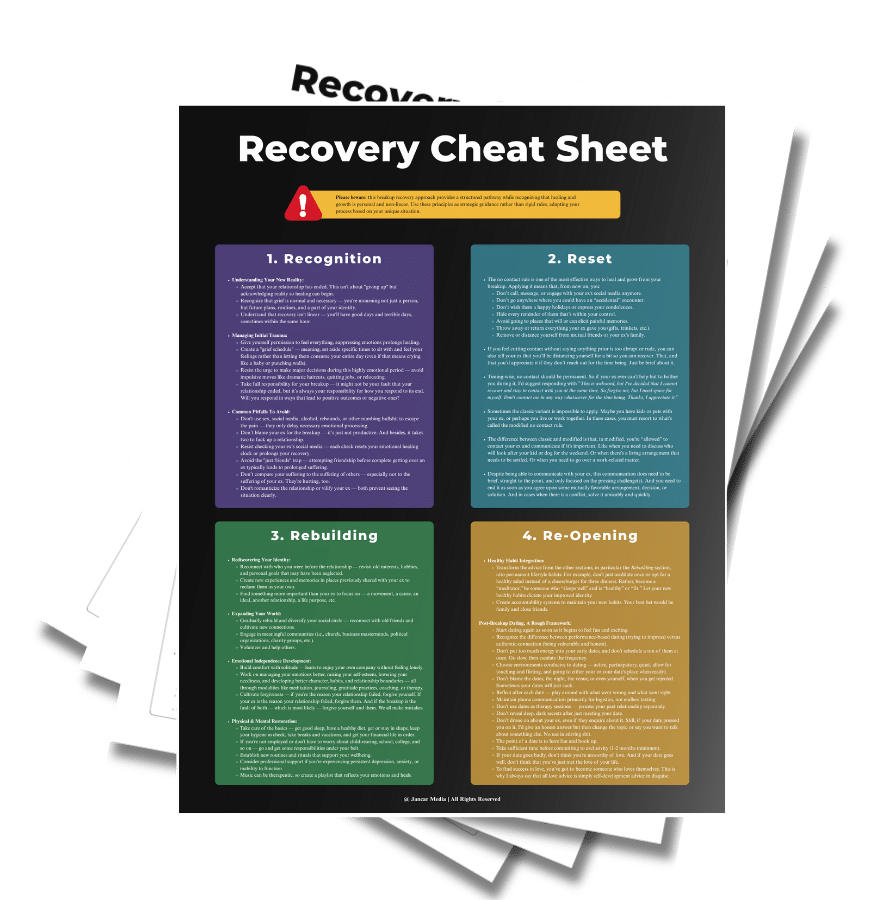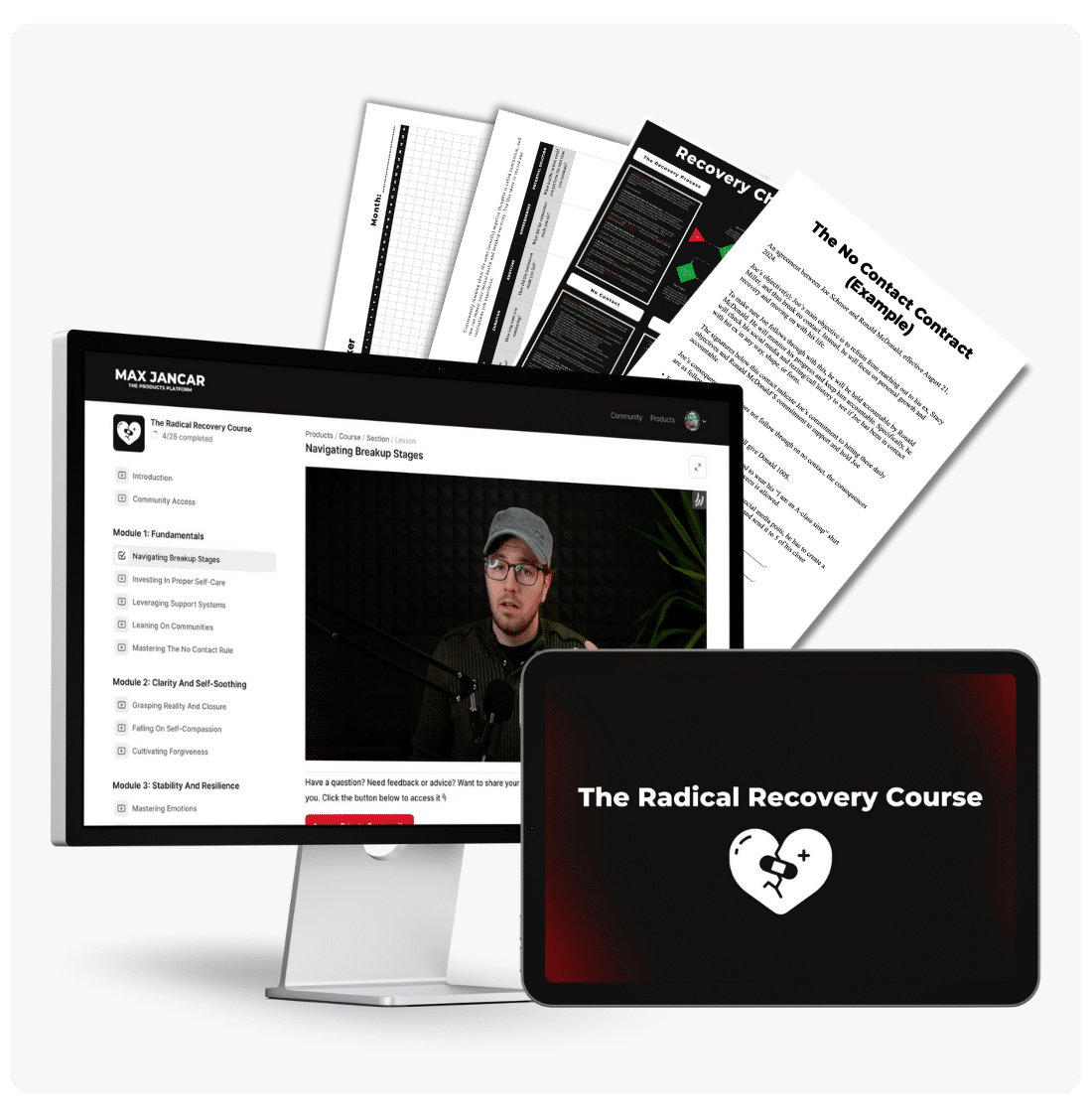Click play to listen to this article.
Most relationships fall apart because the people in them have incompatible values they can’t compromise on. For instance, one partner wants to move to another continent and change religions, while the other loathes those ideas.
Yet, for my readers, their relationships fail mainly because they always act out on their trauma, display needy and unattractive behavior as a result, and in doing so, completely turn off their partner. And then they get dumped and their initial trauma only balloons.
In this article, I’ll help you not only unearth your trauma and understand it better but also provide practical advice for overcoming it. Hopefully once you do overcome it, your relationships will improve. So in the words of the great Tom Brady: let’s fucking go.
A guide to breakup recovery based on embracing discomfort, extracting wisdom from dark moments, and healing through evidence-based practices.
Order Your CopyThe Two Worlds
It all starts with the bloody and painful mess that is birth. And like all infants, once here, you’re completely clueless, vulnerable and dependent on those around you. Your personality and character are also exceptionally mouldable during this time due to your brain still developing.
In an ideal world, your parents would always make the right decisions and be dedicated full-time to raising you. They would nurture and affirm you, take care of your emotional needs, set healthy boundaries and limits, and protect you from harm, all while preparing you to eventually take care of yourself without them.
But in the real world, your parents fuck up — sometimes rarely, sometimes occasionally, other times often. Nurture and affirmation become infrequent and scarce. Boundaries and limits get overstepped, shattered, and shat on. Emotional needs go unmet. And protection goes out of stock.
This cheat sheet lays out 40+ solutions to overcoming a breakup so you can create a new opportunity for love — be that with your ex or someone completely different.
Get The Free Cheat SheetThe Aftermath Of Our World
There are three ways to respond to your upbringing:
- If you’re lucky enough to be raised in an environment even remotely similar to the ideal world, you trust and respect yourself and likely have healthy and secure self-esteem and relationships. You develop a secure attachment style. You lucky, lucky fucker.
- If you’re raised amid neglect — when a caregiver abandons you, is detached from you, fails to engage with you emotionally, or doesn’t appropriately nurture you — you likely end up feeling unwanted, inadequate, and unimportant, become indecisive and spineless, often even depressed. You develop an anxious attachment style.
- If you’re raised by parents who are uncomfortable with their emotions and rarely express them, only meet some of your needs, or are smothering, overbearing, and overcontrolling, you likely wind up distrustful, cold, cut off from your feelings, and afraid of intimacy and vulnerability. You develop an avoidant attachment style.
And while early experiences with parent(s) considerably influence your attachment style and your relationship with yourself, they are not the only factor that determine these things.
Trauma Has Many Entrances
The emotional entrance: In our earliest years, we’re like a sponge, soaking up emotions from everyone around us, then later internalizing them. Say you were raised by a single mom with money issues — her anxiety, stress, and fear will indeed be reflected in you. Or say a depressed and violent father raised you — likewise, his anger, misery, and spitefulness will become a part of you.
The physical entrance: You get spanked, hit, bullied, tortured, raped, etc. — obviously these instances of physical abuse all make way for trauma. But what’s not so obvious is that even invasive medical procedures like circumcision or getting stitches may register the exact same as physical abuse.
The intellectual entrance: this path to trauma buildup occurs when your parents try to over-control you, habitually criticize you, or set unreasonable expectations. Families that adhere to such rigid rules usually believe that any manifestation of a child’s individuality is an immediate threat. Thus, they attack it and ultimately cause trauma.
The Psychological Problem Of Trauma
An online course that teaches you how to heal and grow from a breakup so you can create a new possibility for love — with or without your ex.
Get Instant AccessThe aftermath of any painful event(s) can leave a wound. These wounds are technically trauma. Now, this trauma can develop as a result of a single and large malicious act or through the constant repetition of smaller ones.
And each flavor of trauma creates a particular sort of personal issues and baggage that not only fuck up one’s relationships, but also one’s emotional, behavioral, cognitive, and moral development. What’s even worse is that many people think their caregivers fucked them up intentionally. But more likely, they just didn’t know any better.
My parents, for instance, still believe they gave me everything I needed to lead a healthy life. In reality, they unequivocally failed to provide me with adequate emotional support. My father never paid much attention to me, and my mom constantly dismissed how I felt, minimized my problems, and avoided healthy conflict and uncomfortable but much-needed conversations.
I ultimately forgave my parents for their shortcomings and blind spots — we all have them. And based on the experience concluded that there is not much evil in this world, just a lot of stupidity. And you should always forgive stupidity.
The Physiological Problem Of Trauma
The wound caused by trauma’s aftermath leaves a physical imprint on the body. And there is a shit ton of scientific research that validates this. Our mind and body are intricately intertwined.
- The repercussions of a traumatic event can flood our brain with stress hormones that fuse with and imbue our memories.
- This makes us feel abnormally anxious, needy, unsettled, and afraid even when the danger of our traumatic event has passed. Think of it as being in a chronic state of fight/flight/freeze mode.
- These conditions bust open the doors to incessant stress, shame, emptiness, and loneliness, as well as hyper-vigilance and hyper-alertness.
- Eventually our body follows suit (our trauma becomes somatized): our muscles get tenser, our sleep-quality plummets, our breathing becomes shallower, our posture gets slouched, and we start walking through life, interacting with its ebbs and flows, clumsily — like we have cinderblocks for feet.
- At worst, we develop digestive problems, migraines, autoimmune disorders, chronic fatigue, and chronic back and neck pain.
Trauma Can Fuck Up Your Identity And Relationships (And The World)
If you had a dysfunctional family environment, you likely played a certain role that minimized much-needed healthy conflict and detracted your parents from addressing and resolving their issues. These roles are in psychology called Childhood Trauma Archetypes and more or less reflect the following:
- The Scapegoat/Troublemaker: constantly blamed for family issues, guilt-ridden, and full of shame, everything they do is seen as bad or wrong (even when it’s not).
- The Try-Hard: constant need to prove themselves, overcompensation, trying too hard, taking up too much responsibility.
- The Lost Child: quiet and withdrawn, low self-esteem, shitty social skills, feelings of worthlessness and inadequacy, debilitating anxiety, depression.
- The Hero/Placater: inability to say “no” to others, constant minimizing of personal needs, people-pleasing, self-marginalization.
- The Mascot/Clown: cheering up, lightening the mood, and entertaining everyone in the family to avoid conflict (a perfect example here would be Will Smith).
If developed, these roles also tend to spill into your social and romantic life. You essentially start acting out the same patterns you exhibited to keep your family life as stable as possible. There are two outcomes to this.
If your friends or romantic prospects come from a similar family environment and share complementary trauma, you’d likely develop lasting, toxic relationships with them. Whereas if they don’t come from a similar family environment and share little to no complementary trauma, you’d likely ruin the relationships and end up on your own.
On an even grander scale, trauma often forms the foundation for much of the perceived evil we see in the world. Wounded adults in society unconsciously perpetuate their trauma, project it onto others and everyday situations, and see threats and dangers where there are none.
This insecure mindset only triggers them more, making them display hurtful and disturbing behaviors like threatening or abandoning people, throwing plates at their partner, or kicking their dog in the face. Knowing this, other people’s hurtful and disturbing actions mostly derive from a place of fear and, as I pointed out earlier, stupidity — not necessarily pure malice.
Breakup Trauma: The Exacerbation Of General Trauma
A breakup often only re-affirms and exacerbates a person’s trauma. Think of it as getting punched in the nose one day and then getting kicked in the same spot again the next.
In other words, if you suffer from low self-esteem and jealousy issues, a traumatic breakup will only crush your self-esteem further and manifest more jealousy issues. Or if you see yourself as an unworthy sack of shit, breakup trauma will only cause you to buy into your bullshit with more gusto.
This is why it’s so difficult for people who are already traumatized to get over a breakup. And the worst part about it is that many people who get into one have no idea they’ve been traumatized further by it in the first place — they just can’t fathom having emotional issues, let alone new emotional issues on top of the old, worn-out ones.
Which brings us to our next point…
Seeing Your Issues Is Hard
Your beliefs, behaviors, and adaptations result from years-long mental programming through habits and routines. They are literally baked into your brain’s architecture. So no shit seeing yourself with any objectivity is a pain in the ass.
But one thing you can do to better understand how your past can fuck up your present is by working backward. Here are a few examples. Ask yourself:
- Do you prioritize other people’s perception of you over your perception of yourself?
- Are you always trying to please others, save them, fix their problems, delete their happiness?
- Are you relentlessly chasing perfection and beating yourself up for every failure and setback?
- Do you find dealing with your emotions difficult and uncomfortable, and like you should toughen up and suppress or avoid feeling them?
- Are you in such denial that you take your family being fucking amazeballs as gospel because Dad acted as if he was an infallible God that must be mindlessly obeyed, so criticizing him would be the equivalent of blasphemy?
Everyone Can React Differently To The Same Trauma
I know many people who grew up feeling neglected, for example. A good chunk of them didn’t take it as well as me.
- Some tried to forget their pain through high-risk activities like riding their motorcycle at dangerous speeds or skydiving (trauma arousal).
- Some vilified their parents, cut everyone out of their life, and started to loathe and hurt themselves (trauma shame).
- Others numbed their pain through mindless social media browsing, getting bat-shit drunk every night, masturbating 69 times a day, or injecting heroin in public restroom stalls (trauma blocking).
The point of this is to say that everyone is born with a different tolerance for pain. Some people are simply genetically programmed and conditioned to be more resilient than others. Still, a person’s resilience can be improved through deliberate practice. There are many ways to grow from pain (as covered in this article).
Healing And Overcoming Trauma
We’re all traumatized to some degree and in some way. And while figuring out this degree and our unique type of trauma is, as I wrote, fucking hard, what’s even more challenging (and takes much longer) is overcoming all our emotional shit. That is, deconstructing our false self and restoring our true self.
If you’ve identified any major trauma in your system, the first thing to do is get into therapy. Seriously. Brush the ego aside, scrounge up the cash if you must, and go see a professional. No shame in this.
Preferably a professional specializing in Cognitive Behavioural Therapy, Eye Movement Desensitization and Reprocessing, and/or Somatic Experiencing and Psychomotor Therapy.
That said, here are some additional ways to overcome trauma that seem to work for most people. They are based on disengaging your mind from fictional threats through various physical experiences that deeply and viscerally contradict the helplessness, rage, collapse, and other ramifications of trauma:
- Carrying out mindfulness-based and somatic practices — meditation, yoga, self-compassion, calm breathing, qi-gong, and certain forms of martial arts.
- Leveraging support systems — these comprise family, friends, coworkers, therapists, and other professionals who are willing to actively listen to you and give heartfelt and non-judgmental support and advice.
- Doing expressive arts — playing and listening to music, reading and writing poetry, journaling, sculpting, painting, drawing, photography, collage, fingerpainting, dancing.
- Putting yourself in uncomfortable situations — experiences that provide contradictory evidence against deeply held limiting beliefs, allowing you to drop them faster. (See: vulnerability).
- Changing your relationship with your body — have a healthy diet, get quality sleep, work out and move your body often, get fresh air, don’t overwork yourself.
For you to heal, you ultimately need to force your mind to realize that the fictional threat it’s imagining is gone and that you’re safe. It needs to register that the present is not a horrific event or sequence of horrific events from the past. As said, while not a replacement for professional help, the tips listed above can help you achieve this.
For those who want to dig even deeper into trauma recovery, I suggest picking up these books: The Body Keeps The Score by Bessel Van Der Kolk, Attached by Amir Levine, and The Truth by Neil Strauss.
This cheat sheet lays out 40+ solutions to overcoming a breakup so you can create a new opportunity for love — be that with your ex or someone completely different.
Get The Free Cheat SheetRelated Reading
- Deserving Is Not The Point September 27, 2023
- The Dark Side Of Breakup Recovery May 22, 2024
- The Social Media Detox January 24, 2022
- How To (Realistically) Find Yourself After A Breakup June 16, 2021
- How To Find And Sustain Motivation After A Breakup May 29, 2024
- 10 Tips For Making Better Post-Breakup Decisions March 9, 2023



